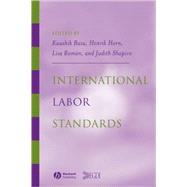
What is included with this book?
Henrik Horn is Professor of International Economics at Stockholm University. His current research focuses on various aspects of the WTO, with particular emphasis on the functioning of its Dispute Settlement system.
Lisa Román is the Secretary to the Expert Group on Development Issues (EGDI) and has been with the secretariat since 1999. She has a background as a development economist and is the author of Institutions in Transition: Vietnamese State Bank Reform (1999).
Judith Shapiro is Professor of Health Economics at the New Economic School, and has been a member of the EGDI since 1995. She is the author of a number of articles on Russian health, labor and mortality, and three co-authored books on transformation and integration in Eastern Europe.
|
ix | ||||
|
xi | ||||
|
xii | ||||
| Part I: Introduction | 1 | (6) | |||
|
|||||
|
|||||
|
|||||
|
|||||
| Part II: The Evolution of Labor Standards | 7 | (98) | |||
|
9 | (96) | |||
|
|||||
|
9 | (1) | |||
|
10 | (1) | |||
|
11 | (12) | |||
|
23 | (7) | |||
|
30 | (1) | |||
|
31 | (5) | |||
|
36 | (3) | |||
|
39 | (21) | |||
|
60 | (1) | |||
|
60 | (6) | |||
|
66 | (2) | |||
|
68 | (1) | |||
|
69 | (15) | |||
|
84 | (1) | |||
|
|||||
|
84 | (4) | |||
|
88 | (4) | |||
|
92 | (1) | |||
|
93 | (1) | |||
|
94 | (1) | |||
|
95 | (10) | |||
|
99 | (6) | |||
|
|||||
|
|||||
| Part III: The Theory of International Labor Standards | 105 | (88) | |||
|
107 | (86) | |||
|
|||||
|
107 | (3) | |||
|
110 | (6) | |||
|
116 | (19) | |||
|
135 | (9) | |||
|
144 | (12) | |||
|
156 | (9) | |||
|
165 | (1) | |||
|
166 | (1) | |||
|
167 | (3) | |||
|
170 | (18) | |||
|
182 | (5) | |||
|
|||||
|
187 | (1) | |||
|
|||||
|
188 | (1) | |||
|
189 | (1) | |||
|
190 | (3) | |||
| Part IV: The Issue of Child Labor | 193 | (78) | |||
|
195 | (76) | |||
|
|||||
|
|||||
|
|||||
|
195 | (1) | |||
|
196 | (5) | |||
|
201 | (17) | |||
|
218 | (7) | |||
|
225 | (12) | |||
|
237 | (4) | |||
|
241 | (13) | |||
|
248 | (6) | |||
|
|||||
|
254 | (2) | |||
|
256 | (1) | |||
|
|||||
|
256 | (11) | |||
|
267 | (1) | |||
|
267 | (4) | |||
| Part V: The International Organization and Enforcement of Labor Standards | 271 | (55) | |||
|
273 | (53) | |||
|
|||||
|
273 | (3) | |||
|
276 | (5) | |||
|
281 | (9) | |||
|
290 | (2) | |||
|
292 | (6) | |||
|
298 | (4) | |||
|
302 | (2) | |||
|
304 | (10) | |||
|
309 | (5) | |||
|
|||||
|
314 | (1) | |||
|
|||||
|
314 | (1) | |||
|
314 | (1) | |||
|
315 | (5) | |||
|
320 | (6) | |||
| Index | 326 |
The New copy of this book will include any supplemental materials advertised. Please check the title of the book to determine if it should include any access cards, study guides, lab manuals, CDs, etc.
The Used, Rental and eBook copies of this book are not guaranteed to include any supplemental materials. Typically, only the book itself is included. This is true even if the title states it includes any access cards, study guides, lab manuals, CDs, etc.